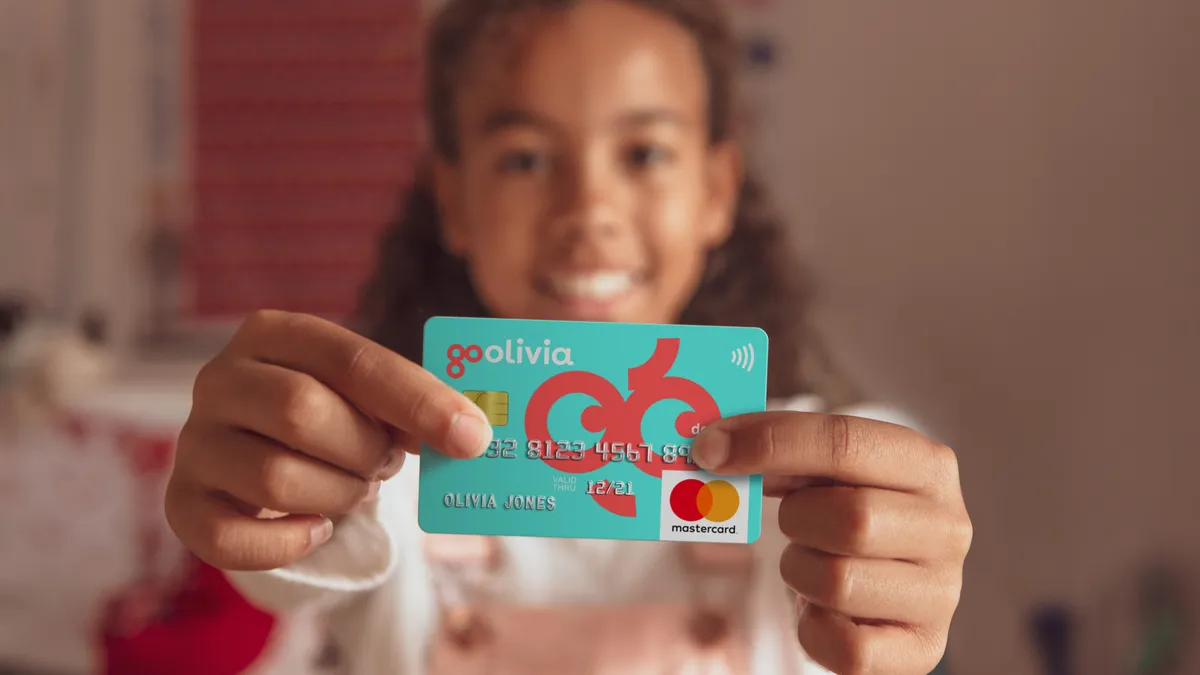Gohenry, a banking app for children, plans to use the majority of its recent $40 million funding round to grow its presence in the U.S.
The U.K.-based challenger bank, which offers a prepaid debit card and bank account with parental controls for 6- to 18-year-olds, announced a $40 million financing round Tuesday led by U.S. growth equity firm Edison Partners, with investment from Gaia Capital Partners, Citi Ventures and Muse Capital.
Gohenry CEO Alex Zivoder said the bulk of the funding will be used to expand the digital bank's marketing efforts in the U.S., a market where it's had a presence since 2018.
The company, which says it has 1.2 million total users, plans to boost its advertising on social media channels, such as Facebook and Instagram, and increase investment in U.S. TV ads.
Zivoder said gohenry is also looking at new distribution channels and plans to leverage the new partnerships it gained in the recent round.
"You'll notice that Citi Ventures is part of this, and of course, on the back of that, we will be looking into banking partnerships and the possibility to expand in the U.S. through banks," he said.
Gohenry is partnering with Community Federal Saving Bank to offer Federal Deposit Insurance Corp.-insured accounts in the U.S.
In addition to technology investments aimed to improve gohenry's product, Zivoder said the company will use the funds to grow its U.S. team.
"We are now in full speed hiring a team in the U.S. to be East Coast-based in Greater New York," Zivoder said.
Gohenry's recent financing round and U.S. expansion plans come as another Gen Z-focused challenger bank, Step, announced its own funding boost last week.
The San Francisco-based startup raised $50 million in a Series B funding round led by Coate Management, with new investors singer Justin Timberlake and music group The Chainsmokers joining returning investors Stripe, Crosslink Capital, Collaborative Fund and singer and actor Will Smith's Dreamers VC.
The round also brought on current and retired sports stars such as Eli Manning, Andre Iguodala, Larry Fitzgerald and Kelvin Beachum, as well as TikTok star Charli D'Amelio, who will also use her platform to promote the digital bank to her more than 100 million followers, the company said.
While Step and gohenry have similar goals — provide digital banking services to the under-18 market — their business models differ.
Like Step and many other challenger banks, gohenry makes money off the interchange fees it charges merchants when customers use its card.
But gohenry also charges a monthly subscription fee of $3.99 per account in the U.S. The subscription fee, Zivoder said, is the company's main source of revenue.
"Interchange is, of course, an element on top of that, but, suffice to say, the number of transactions that a teenager or a child does is not comparable to the number of transactions that adults do," he said. "It's difficult to think that a free model based on interchange alone in our segment has any chance of making it.
"You have to have sources of revenue that are complementary to the interchange, and the only way to do that is if you provide genuinely high value through your product to your customer base," Zivoder said.
The two platforms also differ in their approach to existing customers that age out of the target demographic.
Step CEO CJ MacDonald said a Step account is designed to grow with the customer.
"We are not a teen bank. We're a banking platform and hopefully a brand for the next generation," MacDonald said. "We fundamentally believe that your journey starts as a child or a teenager, and we just want to be there with you from the beginning and grow with you. And if we do our job right — offer relevant financial products and services — hopefully we have a customer for life."
But Zivoder said gohenry doesn't have a product for when account holders reach adulthood.
"Our services are open to parents whose children are between 6 and 18 at the moment when they sign up for the service. So if a parent brings on their child who is 17 at the time, they can basically keep the account until they are 20," he said. "But when a child gets to that age, we don't have today something for them to continue with us."
The option remains open to one day create a product that allows gohenry customers to continue using the account once they reach adulthood, but it's not the main focus for the company at this time, Zivoder said.
"The reason why we're not focusing on what happens at 18 is because we want to do an excellent job at what happens before 18, which is our core," he said.
Zivoder said customers often ask for gohenry to launch a service that allows for them to continue on the platform after they age out.
"I have customers who are writing us at the end of their tenure to thank us for all these years that we have been helping them learn about money, and it's with some sorrow that they're leaving us," he said. "You don't see a lot of banks who get their customers to write to them because they are leaving them, so that tells you we are really hitting a chord."













